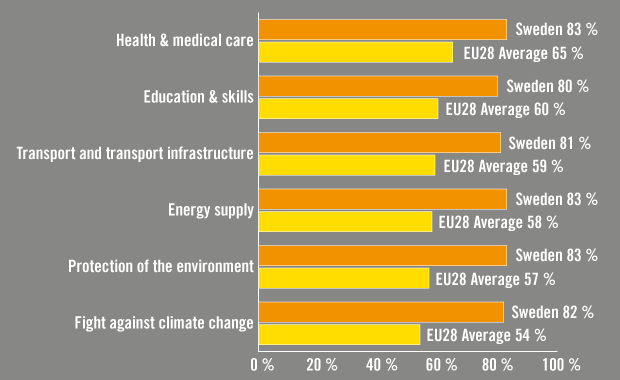Sweden is one of the EU countries with the most confidence in the potential of science and technological innovation to solve the societal challenges that we currently face, according to a new Eurobarometer. Swedes also rank climate change and the protection of the environment as their top priorities whereas, most of the rest of the EU want to see job creation and health care tackled first.

Some 27,910 EU citizens were interviewed as part of the Eurobarometer on “Public perceptions of Science, Research and Innovation”. They were asked to identify which of 13 areas they would like science and innovation to prioritise over the next 15 years and, then, whether they believed that these issues could be realistically addressed both through science and innovation and through people’s behaviour and actions.
Jobs and health – an EU priority
Overall, health and medical care and job creation are seen as the main priorities by most EU countries, with 16 Member States choosing job creation as their first priority and 10 countries selecting health and medical care. Swedes, however, along with Denmark, live up to their environmentally-friendly reputation, choosing the fight against climate change and the protection of the environment as most important.
Swedes have confidence in science and people
The results show that most EU citizens believe it is science and innovation rather than people’s actions and behaviour that will lead to the most positive impacts in the future. However, Sweden, along with the other Nordics, is consistently more optimistic that positive impacts can be achieved by both science and technological innovation and people’s actions and behaviour.
Sweden is the EU country with the highest proportion of respondents who expect a positive impact from science and technology on the protection of the environment (83%), climate change (82%) and transport and transport infrastructure (81%), compared to EU averages of 57%, 54% and 59%, respectively. Swedes also rank second highest for energy supply (83%), health and medical care (83%), and education and skills (80%).
Similarly, Swedes have much higher optimism in people’s ability to bring about change, ranking highest in areas such as the protection of the environment (70%), the fight against climate change (67%), the availability and quality of food (64%) and the reduction of inequalities (55%), compared to EU averages of 46%, 38% and 31%.
The areas that Swedes think are least likely to be improved due to science and technology are the protection of personal data (43%) and the reduction of inequalities (37%).
The survey supports VA’s own findings in its annual barometer, which indicates that Swedes have strong confidence in the potential of research to solve societal problems. In the 2013/2014 VA barometer 65% of respondents believe that there is a good chance that research will help to slow climate change and 88% say that scientific developments of the last 10−20 years have made life better. In Sweden public confidence in scientists is currently at a record high, with 89% of Swedes having fairly or very high confidence in scientists at universities.
A positive trend despite some sceptics
Alongside the Nordic countries, Ireland, Malta and Spain stand out as being particularly optimistic. But not everyone in the EU is quite so positive. In countries like Austria, Germany, Greece and Italy, citizens have consistently lower expectations that there will be positive changes across all the areas, indicating a general level of pessimism for the future.
Overall, however, the findings are considered encouraging, with at least half of Europeans believing that science and technological innovation will have a positive impact in addressing seven of the issues facing society in the next 5 years.
Scientific education across Europe
The Eurobarometer also looks at the respondents’ own level of scientific education and whether they have studied science or technology at school or elsewhere. More than half of Europeans (56%) have studied science or technology, 44% at school and 16% at university or college. In four Member States, including Sweden (33%), citizens were most likely to have studied science or technology at university or college. 32% of Swedes studied science and technology at school.
Background
The aim of the Special Eurobarometer 419 on “Public perceptions of Science, Research and Innovation” is to help inform the European Commission’s Horizon 2020 research programme by providing insight on which areas European citizens would like scientific research to focus on over the next 15 years.
The survey was carried out in the 28 Member States of the European Union between 14th and 26th of June 2014. Some 27,910 respondents from different social and demographic groups were interviewed face-to-face. In Sweden 1,050 people were interviewed.
